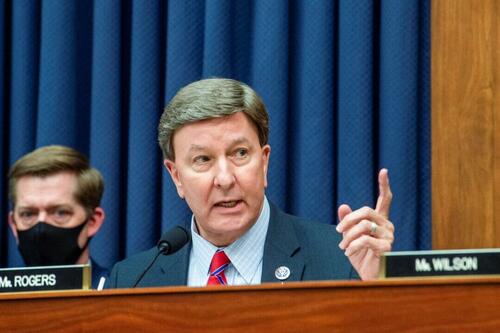
Authored by Caden Pearson via The Epoch Times (emphasis ours),
The House Armed Services Committee adopted an amendment in the annual defense policy bill on May 22 that, if cleared through Congress, would force the Pentagon to rehire U.S. troops who were fired for refusing a COVID-19 vaccine.

The measure was adopted late on May 22 by lawmakers on the panel, who marked up and advanced their version of the annual appropriations bill, authorizing a defense budget of $849.8 billion.
The 2025 bill, titled the Servicemember Quality of Life Improvement and National Defense Authorization Act, will serve as the base text for forthcoming debate as it makes its way through Congress.
On May 22, Rep. Nancy Mace (R-S.C.), who offered the amendment on rehiring veterans separated under the vaccine mandate policy, confirmed its adoption.
During the debate, she said the measure would direct the Pentagon to develop a strategy to recruit from among the thousands of servicemembers who “were made veterans overnight” under the COVID-19 vaccine mandate.
“This amendment seeks to address the loss of skilled, experienced personnel who were willing and able to serve their country and overcome the resistance of the Department in recruiting from this population,” Ms. Mace said ahead of a panel vote.
“The Department has so far failed to recruit a significant number of servicemembers separated under the COVID mandate. This is unacceptable.”
‘Vaccines Save Lives’
Offering a counter perspective after Ms. Mace spoke, Rep. Salud Carbajal (D-Calif.) said servicemembers are required to get a broad range of vaccines, including region-specific vaccines, when deployed to certain areas.
“Vaccines save lives,” Mr. Carbajal told lawmakers on the panel.
“I must say, it’s bewildering how the COVID-19 vaccine has become the boogeyman issue, but in reality, it is a readiness issue. We currently vaccinate our forces to protect them and to protect their fellow troops.”
Congress ended the Pentagon’s COVID-19 vaccine mandate in 2022 and last year directed Defense Secretary Lloyd Austin to create a path back to service for those who were separated for refusing the vaccine.
On April 30, Mr. Austin told the panel that he didn’t know of any efforts to recruit servicemembers who had been previously let go under the mandates. Ms. Mace said on May 22 that this was “disappointing.”
The measure faces an uncertain future later this year when the committee meets with the Democrat-led Senate Armed Services Committee to reconcile differences in the National Defense Authorization Act before full passage in Congress.
According to the Pentagon, during fiscal year 2023, the military services collectively missed recruiting goals by about 41,000 recruits. This was attributed to a “smaller eligible population.”
Other reasons stated included the attractiveness of jobs in the private sector, younger generations having “low trust” in the military and following other career paths, and younger people having fewer families who served, decreasing their wish to follow suit.
Committee Advances Draft Defense Spending Bill
House Armed Services Committee Chair Rep. Mike Rogers (R-Ala.) said the 2025 defense spending bill considers the quality of life for servicemembers, boosting compensation money, improving housing, expanding health care and child care access, and other issues that directly affect troops and their families.
This is in addition to strengthening the military to face challenges posed by China, Iran, Russia, and North Korea, according to Mr. Rogers.
“Strengthening our military and investing in our defense is how we send our adversaries a message that we will not be intimidated,” he added.
The lawmakers authorized a defense budget of $849.8 billion in line with the debt ceiling agreement made earlier this year.
“For the first time in decades, the bill before us today carries a different short title. It is the Servicemember Quality of Life Improvement and National Defense Authorization Act. We did that to underscore the tremendous gains this bill makes toward improving the quality of life for all of our service members and their families,” Mr. Rogers said in a statement.
“No service members should have to live in squalid conditions. No military family should have to rely on food stamps to feed their children. And no one serving this country should have to wait weeks to see a doctor or mental health specialist. This bill goes a long way toward fixing those problems.”
He welcomed the bill’s passage through the committee.
The bill was introduced on April 18 by Mr. Rogers and ranking Democratic member Adam Smith (D-Wash.) to serve as the base text for the 2025 defense spending bill.
Authored by Caden Pearson via The Epoch Times (emphasis ours),
The House Armed Services Committee adopted an amendment in the annual defense policy bill on May 22 that, if cleared through Congress, would force the Pentagon to rehire U.S. troops who were fired for refusing a COVID-19 vaccine.

The measure was adopted late on May 22 by lawmakers on the panel, who marked up and advanced their version of the annual appropriations bill, authorizing a defense budget of $849.8 billion.
The 2025 bill, titled the Servicemember Quality of Life Improvement and National Defense Authorization Act, will serve as the base text for forthcoming debate as it makes its way through Congress.
On May 22, Rep. Nancy Mace (R-S.C.), who offered the amendment on rehiring veterans separated under the vaccine mandate policy, confirmed its adoption.
During the debate, she said the measure would direct the Pentagon to develop a strategy to recruit from among the thousands of servicemembers who “were made veterans overnight” under the COVID-19 vaccine mandate.
“This amendment seeks to address the loss of skilled, experienced personnel who were willing and able to serve their country and overcome the resistance of the Department in recruiting from this population,” Ms. Mace said ahead of a panel vote.
“The Department has so far failed to recruit a significant number of servicemembers separated under the COVID mandate. This is unacceptable.”
‘Vaccines Save Lives’
Offering a counter perspective after Ms. Mace spoke, Rep. Salud Carbajal (D-Calif.) said servicemembers are required to get a broad range of vaccines, including region-specific vaccines, when deployed to certain areas.
“Vaccines save lives,” Mr. Carbajal told lawmakers on the panel.
“I must say, it’s bewildering how the COVID-19 vaccine has become the boogeyman issue, but in reality, it is a readiness issue. We currently vaccinate our forces to protect them and to protect their fellow troops.”
Congress ended the Pentagon’s COVID-19 vaccine mandate in 2022 and last year directed Defense Secretary Lloyd Austin to create a path back to service for those who were separated for refusing the vaccine.
On April 30, Mr. Austin told the panel that he didn’t know of any efforts to recruit servicemembers who had been previously let go under the mandates. Ms. Mace said on May 22 that this was “disappointing.”
The measure faces an uncertain future later this year when the committee meets with the Democrat-led Senate Armed Services Committee to reconcile differences in the National Defense Authorization Act before full passage in Congress.
According to the Pentagon, during fiscal year 2023, the military services collectively missed recruiting goals by about 41,000 recruits. This was attributed to a “smaller eligible population.”
Other reasons stated included the attractiveness of jobs in the private sector, younger generations having “low trust” in the military and following other career paths, and younger people having fewer families who served, decreasing their wish to follow suit.
Committee Advances Draft Defense Spending Bill
House Armed Services Committee Chair Rep. Mike Rogers (R-Ala.) said the 2025 defense spending bill considers the quality of life for servicemembers, boosting compensation money, improving housing, expanding health care and child care access, and other issues that directly affect troops and their families.
This is in addition to strengthening the military to face challenges posed by China, Iran, Russia, and North Korea, according to Mr. Rogers.
“Strengthening our military and investing in our defense is how we send our adversaries a message that we will not be intimidated,” he added.
The lawmakers authorized a defense budget of $849.8 billion in line with the debt ceiling agreement made earlier this year.
“For the first time in decades, the bill before us today carries a different short title. It is the Servicemember Quality of Life Improvement and National Defense Authorization Act. We did that to underscore the tremendous gains this bill makes toward improving the quality of life for all of our service members and their families,” Mr. Rogers said in a statement.
“No service members should have to live in squalid conditions. No military family should have to rely on food stamps to feed their children. And no one serving this country should have to wait weeks to see a doctor or mental health specialist. This bill goes a long way toward fixing those problems.”
He welcomed the bill’s passage through the committee.
The bill was introduced on April 18 by Mr. Rogers and ranking Democratic member Adam Smith (D-Wash.) to serve as the base text for the 2025 defense spending bill.
Loading…






